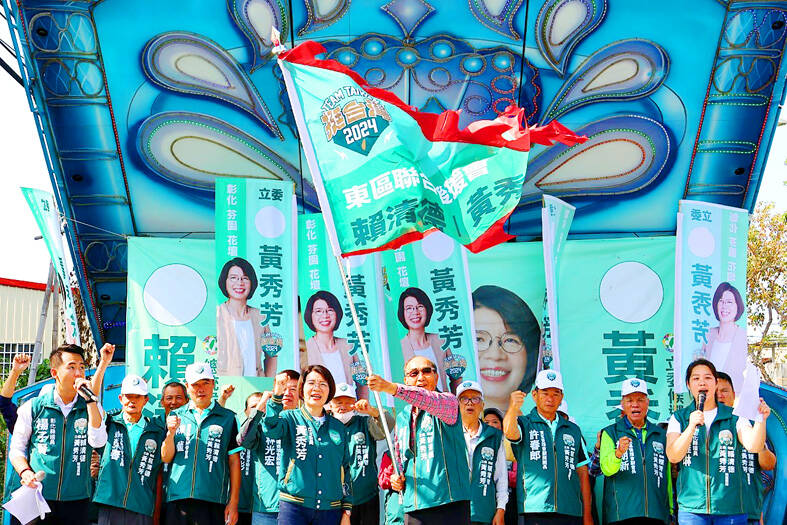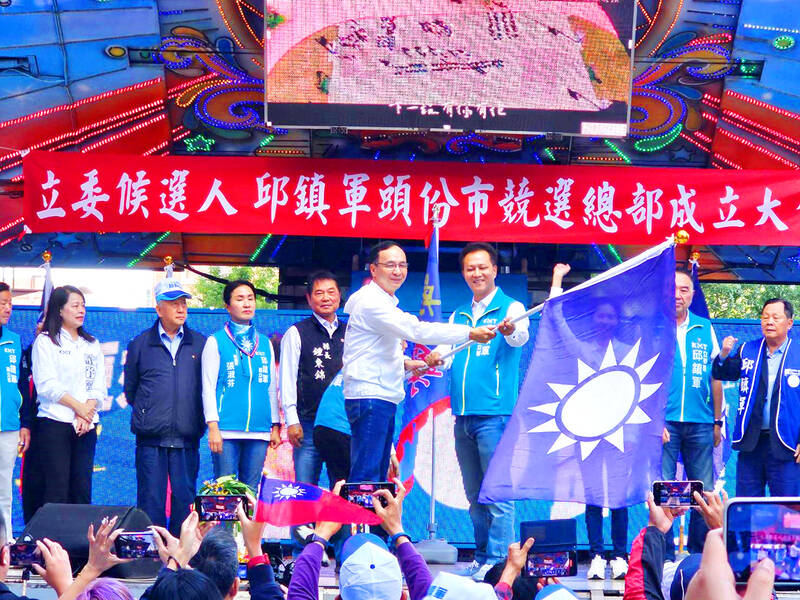The nation’s political parties are weighing the possible effects on legislative elections of a failure by the Chinese Nationalist Party (KMT) and Taiwan People’s Party (TPP) to strike a deal for a joint presidential ticket.
Friday marked the last day of candidacy registration for both presidential and legislative elections next year.
According to the Central Election Commission (CEC), 315 legislative candidates have registered to compete for 73 seats in the single-member districts, while 16 political parties registered their lists, with 178 nominees, for 34 at-large seats.

Photo courtesy of Huang’s campaign office
There will also be three lawmakers elected by members of the lowland indigenous people constituency and three by the highland indigenous people constituency.
For the at-large seats, the KMT, the TPP and the ruling Democratic Progressive Party (DPP) all registered to the fullest extent of 34 candidates.
Smaller parties registered modestly, with the People First Party submitting a list of 10, the New Power Party and the New Party both eight, and the Taiwan Statebuilding Party with seven.

Photo: CNA
For the 73 districts of the country, the DPP nominated 69 candidates, the KMT 65 and the TPP 10, among others.
DPP party insiders said the party faced an uphill battle to retain its legislative majority.
In 10 to 15 districts, DPP candidates face fierce competition due to factors such as a division in the pro-DPP camp, or grudges remaining from the party primaries.

Photo: Peng Chien-li, Taipei Times
The breakdown of the KMT-TPP joint presidential ticket might benefit the DPP in those districts where the combined support for the KMT and the TPP is greater than that for the DPP, such as the Taipei and New Taipei, a DPP source said.
A KMT source said that the breakup was expected to have little impact on the outcome in KMT or DPP safe seats and the most affected districts would be those that the KMT has even odds of winning.
Neither the DPP nor the KMT seems to expect to achieve a majority in the legislature, with each aiming for 50 seats in the 113-member chamber.
There is still a possibility of the KMT and the TPP cooperating in the parliament, so long as “a total war” is not waged, the two sides can still compete under the tacit understanding of maximizing the non-DPP faction, a KMT source said.
The TPP has only entered two races, one in Kaohsiung and one in Taichung, outside its base in northern Taiwan.
The TPP’s other district candidates are in Taipei, New Taipei City, Taoyuan, Yilan County, Kinmen County and Lienchiang County (Matsu), where they will meet competition from both major parties. TPP Chairman Ko Wen-je’s (柯文哲) younger sister Ko Mei-lan (柯美蘭) is running in Hsinchu City as an independent.

POSITIVE DEVELOPMENT: Japan and the US are expected to hold in-depth discussions on Taiwan-related issues during the meeting next month, Japanese sources said The holding of a Japan-US leaders’ meeting ahead of US President Donald Trump’s visit to China is positive news for Taiwan, former Japan-Taiwan Exchange Association representative Hiroyasu Izumi said yesterday. After the Liberal Democratic Party’s landslide victory in Japan’s House of Representatives election, Japanese Prime Minister Sanae Takaichi is scheduled to visit the US next month, where she is to meet with Trump ahead of the US president’s planned visit to China from March 31 to April 2 for a meeting with Chinese President Xi Jinping (習近平). Japan and the US are expected to hold in-depth discussions on Taiwan-related issues during the

‘LIKE-MINDED PARTNER’: Tako van Popta said it would be inappropriate to delay signing the deal with Taiwan because of China, adding he would promote the issue Canadian senators have stressed Taiwan’s importance for international trade and expressed enthusiasm for ensuring the Taiwan-Canada trade cooperation framework agreement is implemented this year. Representative to Canada Harry Tseng (曾厚仁) in an interview with the Central News Agency (CNA) said he was increasingly uneasy about Ottawa’s delays in signing the agreement, especially as Ottawa has warmed toward Beijing. There are “no negotiations left. Not only [is it] initialed, we have three versions of the text ready: English, French and Mandarin,” Tseng said. “That tells you how close we are to the final signature.” Tseng said that he hoped Canadian Prime Minister Mark Carney

President William Lai (賴清德) yesterday bestowed one of Taiwan’s highest honors on Saint Vincent and the Grenadines (SVG) Ambassador Andrea Clare Bowman in recognition of her contributions to bilateral ties. “By conferring the Order of Brilliant Star with Grand Cordon on Ambassador Bowman today, I want to sincerely thank her, on behalf of the Taiwanese people, for her outstanding contribution to deepening diplomatic ties between Taiwan and SVG,” Lai said at a ceremony held at the Presidential Office in Taipei. He noted that Bowman became SVG’s first ambassador to Taiwan in 2019 and

A man walks past elementary school artworks at the Taipei Lantern Festival in Ximen District yesterday, the first day of the event. The festival is to run from 5pm to 10pm through March 15.